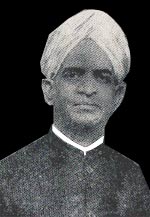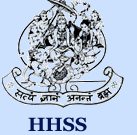|
|
 |

|
Sri N.V. Raghavan
1879-1943
|

|
 |
It
was on the morning of the 2nd February 1943 that the local newspapers
flashed the sad news that Mr. N. V. Raghavan had died during
the early hours of thast day at his residence at Mylapore. Through
it was known to his friends a week prior to his death that hopes
of recovery were remote, the news was tragic. Friends, admirers
and relations rushed to his residence to pay their homage to
the mortal remains of that great man. He was an impressive and
delightful personality and was feared and respected for his
independence. He was frank and upright and hated all sham and
insincerity.
He was born of poor but cultured parents on 27th March, 1879.
|
He
stuided in the S.P. High school, Trichy, now known as Bishop
Heber dency. It was at this time that the late Sir P. Rajagopalachariar
was in search of a bridegroom of a promising career and coming
to know, through one Mr.Pattabhirama Pillai, Dy. Collector,
of Raghavan's brilliant success at the matriculation examination
gave his second daughter in marriage to him. Raghavan then left
Trichy for Madras to study in the Presidency College. IN 1899
he appeared in two subjects (Englishand Sanskrit) for the B.A.degree
examination, as he was not sure of getting a first class in
the third subject (Mathematics). In the two subjects he secured
first class and next year he got a first class in the remaining
subject also. In 1902, he appeared for the Indian Finance Department
competitive examination, now called The Indian Audit Accounts
Service, and came out successful. He rose to the rank of Accountant-General
and retired in 1930, though he might have continued to serve
for two years more.
In 1932, he was appointed Minister in charge of Finance in the
Indore State, but he came back in 1933. he accepted the Vice-Presidentship
of the Hindi Pracharka Sabha, as he was a lover of Hindi and
wanted to spread hindi in South India. He resigned subsequently
when he found that he could not raise sufficient funds to do
effective work in spreading Hindi in South India. At the personal
request of the Vice-Chancellor of the Benares Hindu University
to help him in maintaining accounts, he spent some months in
Benares giving valuable suggestions. He was a director of the
Indo-Commercial Bank for four years till his death. He was a
member of our School Committee of Management from 1929 till
his death.
Being born of poor parents, he appreciated privations and sufferings
in others due to poverty. While an officer, he was ever sympathetic
to the low paid clearks. The same sympathetic attitude he maintained
to the teachers of our school. The leave rules and the introduction
of scales of pay for different grades of teachers where in no
small measure due to him. He successfully created a feeling
in the minds of his subordinates that he would impersonally
consider the issues raised and do justice. His justice was always
tempered with mercy. He was a man of sterling independence and
he shunned hypocrites and flatterers. He was ever a candid critic.
In private public life he was not swayed by the vanities that
corrupt men of importance and influence. He was always of a
studious habit and his reading extended to almost all subjects
of interest. He was passionately fond of classical and pure
Carnatic music and was a tolerable violinist. He cared very
little for fleeting remarks or fr45ivolous talk. He seldom endeavoured
to know what other people though of him. He felt no urge to
follow the fashions of the day. His only relaxation was to walk
both in the morning and in the evening and visit his intimate
friends.
He was a straight man loving a quiet life. He was 'matter of
fact' and rarely courted wide popularity. He had no belief in
adjustability as a virtue. He declared himself in adequate language,
indulged in no make-believes of coloured expressions and if
at all he was sought, people must be willing to take anything
he choose to gr5ace them with. He must act on his own and would
scarcely be led. He was an acute thinker. He did not make a
display of his talents, for he did not believe in mere show.
He was a true free-thinker following his own path with a frankness
and faith of his own. In him nature must have felt proud to
say that there was a man.
|
| End of the Content. Press Alt+K
to navigate |
|
|
